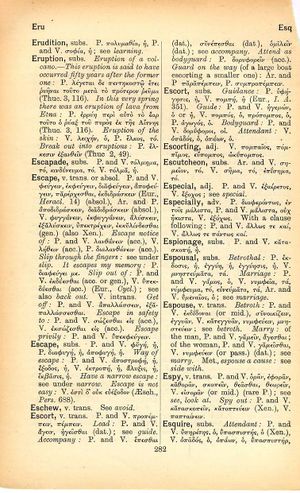escape
ἄνθρωπος ὢν ἥμαρτον· οὐ θαυμαστέον → being human I made a mistake; there is nothing remarkable about it
English > Greek (Woodhouse)
v. trans. or absol.
P. and V. φεύγειν, ἐκφεύγειν, διαφεύγειν, ἀποφεύγειν, παρέρχεσθαι, ἐκδιδράσκειν (Eur., Heracl. 14) (absol.), Ar. and P. ἀποδιδράσκειν, διαδιδράσκειν (absol.), V. φυγγάνειν, ἐκφυγγάνειν, ἀλύσκειν, ἐξαλύσκειν, ὑπεκτρέχειν, ἐκκυλίνδεσθαι (gen.) (also Xen.). Escape notice of: P. and V. λανθάνειν (acc.), V. λήθειν (acc.), P. διαλανθάνειν (acc.). Slip through the fingers: see under slip. It escapes my memory: P. διαφεύγει με. Slip out of: P. and V. ἐκδύεσθαι (acc. or gen.), V. ὑπεκδύεσθαι (acc.) (Eur., Cycl.); see also back out. V. intrans. Get off: P. and V. ἀπαλλάσσειν, ἐξαπαλλάσσεσθαι. Escape in safety to: P. and V. σώζεσθαι εἰς (acc.), V. ἐκσώζεσθαι εἰς (acc.). Escape privily: P. and V. ὑπεκφεύγειν. subs. P. and V. φυγή, ἡ, P. διαφυγή, ἡ, ἀποφυγή. ἡ. Way of escape: P. and V. ἀποστροφή, ἡ, ἔξοδος, ἡ, V. ἐκτροπή, ἡ, ἄλυξις, ἡ, ἔκβασις, ἡ. Have a narrow escape: see under narrow. Escape is not easy: V. ἐστὶ δʼ οὐκ εὐέξοδον (Aesch., Pers. 688).

